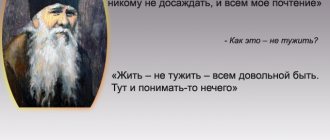T
That time
- the same
Yours
- yours
You
- you
Teku
- I'm running
The same, the same
- That's why
Tee
- you
Aphids, decay, decay
- damage, destruction; original sin
Tokmo
- only, only only
Tochiyu
- only
Thin
- diligently
Toya
- that one
I demand
- need
Troparion
- a short song of praise in honor of a holiday or saint
Troparia Trinity
- troparia in honor of the Holy Trinity
Tune
- in vain, in vain
Treasure
- with nothing
You I
- those
Top of page
“Blessed art thou, O Christ our God”
On the Eighth Sunday after Easter, Pentecost is celebrated, also called the day of the Holy Trinity in the Russian Church. We offer a theological and philological commentary on the troparion and kontakion of this holiday.
The Feast of Pentecost is dedicated to the descent of the Holy Spirit on the Apostles. According to the Holy Scriptures, on this day, the fiftieth after the Resurrection of Christ, “tongues as if of fire appeared to the apostles gathered together and rested, one on each of them. And they were all filled with the Holy Spirit, and began to speak in other tongues, as the Spirit gave them utterance” (Acts 2:3-4). It is from that moment that the Holy Spirit dwells in the Church, igniting the flame of faith in people and leading them to salvation:
“This completed the great work of saving the human race”[1], notes Archimandrite John (Krestyankin).
The liturgical hymns for the Feast of Pentecost are contained in the Colored Triodion. Let's look at the most common of them - the troparion and kontakion.
In Church Slavonic they sound as follows.
Troparion:
«Blessed art thou, O Christ our God, Who art wise as fishers of things, having sent down unto them the Holy Spirit, and with them caught the universe, Lover of mankind, glory to Thee.”
Kontakion:
«Whenever the tongues of fusion descended, dividing the tongues of the Most High, when the fiery ones were distributed, all things were called into union; and accordingly we glorify the All-Holy Spirit"[2] .
The original Greek is:
Troparion:
"Εὐλογητὸς εἶ, Χριστὲ ὁ Θεὸς ἡμῶν, ὁ πανσόφους τοὺς ἁλιεῖς ἀναδ ? ένην σαγηνεύσας, φιλάνθρωπε, δόξα σοι.”
Kontakion:
“Ὁτε καταβὰς τὰς γλώσσας συνέχεε, διεμέριζεν ἔθνη ὁ Ὕψιστος ὅτε το ῦ πυρὸς τὰς γλώσσας διένειμεν, εἰς ἑνότητα πάντας ἐκάλεσε, καὶ συμφ "[3].
Among the Russian translations of the troparion there is a version by Archpriest Vladimir Uspensky.
Troparion:
“Blessed are You, Christ our God, who made the fishermen wise men, sending down the Holy Spirit on them, and through them captured the universe. Lover of humanity, glory to You."
Kontakion:
“When the Most High (God) descended, he confused languages and divided the peoples among themselves; when he distributed tongues of fire (at the descent of the Holy Spirit), he called everyone to unity; and we with one accord glorify the All-Holy Spirit.”[4]
Blessed are You, Lord
The troparion begins with an appeal to the Lord with the words: “Blessed are you, Christ our God (Εὐλογητὸς εἶ, Χριστὲ ὁ Θεὸς ἡμῶν.” “Thou art” is a form of the Church Slavonic verb “to be.” This is a kind of indicator, a marker of conversion.
Repeatedly in the Holy Scriptures God is glorified and blessed. The Holy Prophet David exclaims:
“I will bless the Lord at all times” (Ps. 33:2); “Thus I will bless Thee in my belly” (Ps. 62:5).
And the Apostle Paul writes to the Ephesians:
“Blessed be the God and Father of our Lord Jesus Christ, who has blessed us with every spiritual blessing” (Eph. 1:3).
The Church Slavonic verb “bless” means “to call upon, invoke God’s mercy, grace; praise, thank”[5]. The blessing of a person directed to God is an expression of gratitude to the Creator for His love revealed in creation, Providence and the salvation of the world.
A person’s blessing of God is an expression of gratitude to the Creator for His love
St. Justin writes:
“The Church is the whole purpose and their only all-meaning. In it, God has indeed “blessed us with every spiritual blessing” (Eph. 1:3); in it He taught us all the means for our holy and blameless life before God”[6].
The fishermen caught the universe
In the troparion, ordinary fishermen are called catchers. I remember the calling of the first apostles to preach - Andrew and Peter, poor, unlearned people who earned their living by fishing. Just as fishermen extract their catch from the water with the help of nets, so the apostles, with their preaching, save human souls from spiritual destruction and lead them to eternal life.
The troparion says that fishers are not just wise, but “all-wise ,” that is, they have deep, highest wisdom. Its basis lies in the Truth, which the apostles learned from Christ and were called to bring to the world. This wisdom is Divine, which is the opposite of earthly wisdom, for
“God has chosen the foolish things of the world to shame the wise, and God has chosen the weak things of the world to shame the strong things” (1 Cor. 1:27).
This calling is based on the words of the Savior:
“Go and make disciples of all nations, baptizing them in the name of the Father and the Son and the Holy Spirit” (Matthew 28:19).
Therefore, the Greek verb “ἀναδείκνυμι”, translated into Church Slavonic as “appearance” , one of its meanings is the proclamation, election of a person to a certain position, entrusting him with a certain mission[7].
The sending of the Holy Spirit became the fulfillment of the Lord’s promise given to the disciples at the Last Supper:
“When the Comforter comes, whom I will send to you from the Father, the Spirit of truth, who proceeds from the Father, he will testify about Me” (John 15:26).
With the descent of the Holy Spirit, the apostles completely changed, became new people, they felt within themselves strength, boldness and a higher calling to give their lives to serve God and save people.
“caught the universe” with His disciples . The Greek “οἰκουμένη” also has a Russian analogue: “oikoumene” - the entire inhabited earth[8]. For the inhabitants of the Byzantine Empire, this term was one of the key ones. As noted by S.S. Averintsev,
“The Christian power, in its “earthly” dimension the heir to the cosmopolitan Roman Empire, was fundamentally devoid of any ethnic character and, in theory, should have coincided with the entire human world - the “ecumene””[9].
This is how the troparion designates that part of the universe that is inhabited by people. The human world saved by God is mentioned, which glorifies the feat of Christ the Savior with the words: “Lover of mankind, glory to you .
Dividing the language and connecting peoples
Kontakion of the holiday - introduction, proemium to the kontakion of St. Roman the Sweet Singer[10]. In Byzantine hymnography, a kontakion is a long poem that consists of an introduction (proemiya) and stanzas (ikosov). The kontakion of Pentecost consists of the initial kontakion and 18 ikos. But in modern practice, only its beginning and the first ikos are performed.
The basis of the kontakion is the antithesis:
«Whenever He descended, the tongues merged, dividing the tongues of the Most High, but when He distributed the fiery ones, He called everything into union.”
The division of languages is opposed to the union of peoples.
In Church Slavonic the word “language” has two meanings. The first corresponds to the Greek “γλῶσσα” - “speech, adverb”, and the second - conveys the Greek “ἔθνος”, meaning “people, tribe”[11].
The kontakion recalls the division of languages that occurred during the construction of the Tower of Babel:
“And the Lord said, Behold, there is one people, and they all have one language; and this is what they began to do, and they will not deviate from what they planned to do; Let us go down and confuse their language there, so that one does not understand the speech of the other” (Gen. 11: 6-7).
On the day of Pentecost, the Lord sends the apostles the gifts of the Holy Spirit, which should serve to unite and unite all humanity.
The Lord sends the gifts of the Holy Spirit, which should serve to unite all humanity
The apostles, speaking in different languages, were united by the Holy Spirit when “divided tongues as of fire appeared to them, and one rested on each of them” (Acts 2:3). The word “distributing” in Greek is reflected through the verb “διένειμεν” - “to divide into parts, manage, rule”[12], that is, God is in the direct knowledge of who should be given the grace of the Spirit.
Call to Connect
The condescension of grace called people to unity. The Greek “ἑνότητα” is translated as “cohesion, agreement, unification”[13]. The Apostle Paul uses it when he writes to the Ephesians about the unity of the spirit (see: Eph. 4:3) and the unity of faith (see: Eph. 4:13).
The call to unity is indicated by the Greek “ἐκάλεσε”, which is related to the word “ἐκκλησία” - Church[14]. Only in the congregation of believers - in the Church - can one find the grace of the Spirit.
The kontakion ends with a call to glorify the “All-Holy Spirit . Doxology must take place in a single mood, which is accurately conveyed by the Greek “συμφώνως” - “agreed upon, according to”[15]. On the day of the descent of the Holy Spirit, the beginning of the Church of Christ appeared, which became a single Body and an animated Soul[16].
***
The Day of Pentecost is the moment from which the life of the Church began. From the day the Holy Spirit descended on the apostles and their disciples, faith in the Risen Christ and the preaching about Him received universal spread, so that everyone could touch the source of living water flowing into eternal life.
The Troparion and Kontakion of Pentecost again remind Christians of the event that marked the completion of the Savior’s earthly exploit.
I tell you, brethren, the gospel that was preached to you is what you eat, and you stand in it, and you are saved by the word of the gospel, even if you hold it; unless you believe in vain. For I delivered it to you from the first, even as I received it, as Christ died for our sins, according to the scriptures, and as he was buried, and as he rose on the third day, according to the scriptures, and as he appeared to Cephas, even to the one ten: then he appeared to more than five hundred brethren alone , from them many have remained until now, but few have disappeared: then he appeared to James, the same apostle to all: after all, as if he were a certain monster, he appeared to me. For I am one of the apostles, who is not worthy to be called an apostle, and have persecuted the Church of God. It is by the grace of God that I am, and His grace that is in me, was not in vain, but I labored more than all of them: not I, but the grace of God that is with me. Whether they are wretched or not, we preach, and so we believe. Even if Christ is preached as if he has risen from the dead, how can they say among you that there is no resurrection of the dead? And if there is no resurrection of the dead, then Christ has not risen; if Christ has not risen, then our preaching is in vain, and so is your faith. We are also found to be false witnesses of God, because we obeyed God, for He raised Christ, whom He did not raise, unless the dead rise: if the dead do not rise, then Christ is not risen: but if Christ is not risen, your faith is in vain, for you are still in sins yours: for those who died in Christ are lost. (And) even if in this belly we trust in Christ, we are the most wretched of all men. Now Christ has risen from the dead, and has become the firstfruits of those who died. Because death was man, and the resurrection of the dead was man. Just as in Adam all die, so in Christ all shall live, each in his own order: Christ the firstfruits, then those who believed in Christ at his coming. The same death, when he betrays the Kingdom to God and the Father, when he abolishes all authority and all authority and power: for it is fitting for him to reign until he puts all enemies under his feet. The last enemy will be destroyed by death, for you have subdued everything under his nose: never say that everything has been subjugated to him, but it is true that everything has been subjugated to him. When all things are subdued to him, then the Son himself will submit all things to him, that all things may be in God. For the sake of the dead, what will those who are baptized do? If the dead do not rise at all, why are they baptized for the sake of the dead? Why do we also accept troubles at any hour? I die all the days: such is your praise, brethren, that I am imam in Christ Jesus our Lord. Even if we fought against man and beast in Ephesus, what good does it do us if the dead do not rise? Yes, we drink pits, we will die in the morning. Do not be flattered: good customs are corrupted by evil conversations. Be sober righteously and do not sin: for none have ignorance of God, to your shame I say. But someone says: How will the dead rise? in what body will they come? You are foolish, the hedgehog you see, will not live unless you die: and the hedgehog you see, not the body of the future of the seed, but a bare grain, if it happens, wheat or something else from the others: God gives him a body as he pleases, and to every seed his body. Not all flesh is flesh: but there is some flesh by man, and some flesh by cattle, and another by fish, and another by birds. And the heavenly body, and the earthly body: but there is another glory to the heavenly, and another to the earthly: another glory to the sun, and another glory to the moon, and another glory to the stars: a star differs from a star in glory. Likewise is the resurrection of the dead: it is sown in corruption, it is raised in incorruption; it is sown in honor, it is raised in glory; it is sown in weakness, it is raised in power; it is sown in a natural body, it is raised in a spiritual body. There is a spiritual body, and there is a spiritual body. This is what is written: Adam was the first man, the living soul, and the last Adam was the life-giving spirit. But not first the spiritual, but the spiritual, and then the spiritual. The first man is from the earth, ringed: the second man is the Lord from heaven. Like the earthly one, so are the rings: and like the one who is heavenly, so are those who are heavenly: and as we have put on the image of the earthly one, let us also be clothed in the image of the heavenly one. I say this, brethren, because flesh and blood cannot inherit the Kingdom of God, but corruption inherits incorruption. Behold, I tell you a mystery: for we will not all fall asleep, but we will all be changed quickly, in the twinkling of an eye, at the last trumpet: for the trumpet will sound, and the dead will rise incorruptible, and we will be changed: for it is fitting for this corruptible to put on incorruptibility, and for this dead thing to put on immortality. When this corruptible has put on incorruption, and this mortal has put on immortality, then the word will be written: death was sacrificed in victory. Where is the sting, death? Where the hell is victory? The sting of death is sin: but the power of sin is the law. Thanks be to God, who has given us victory through our Lord Jesus Christ. In the same way, my beloved brethren, stand firm, untroubled, always abundant in the work of the Lord, knowing that your work is worthless before the Lord.









